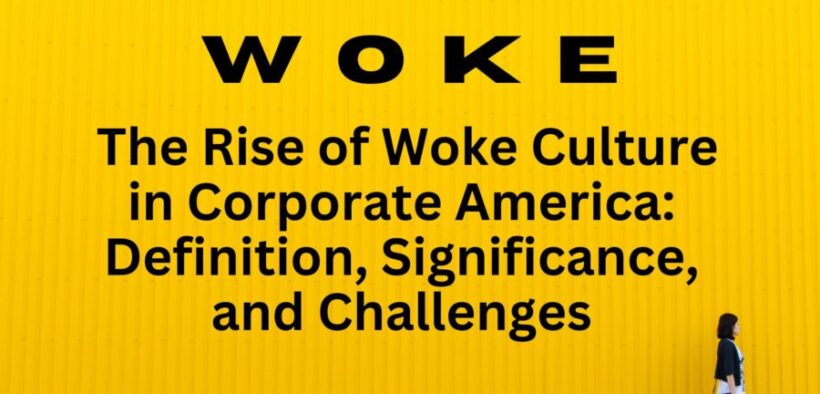The Rise of Woke Culture in Corporate America: Definition, Significance, and Challenges
Share

The term “woke” has gained popularity in corporate America in recent years. “The Rise of Woke Culture in Corporate America: Definition, Significance, and Challenges” delves into the growing prominence of “woke” as a concept in the business world. Woke culture has become a term for companies prioritizing social justice and equality in their hiring practices, operations, and marketing. This article will discuss the definition of woke culture, examine how it is being implemented in the corporate context, analyze its significance, and explore the challenges companies encounter when adopting this ideology. We will also touch on the definition of woke in a different context to provide a more holistic understanding.
Origin of the term “woke”
To begin, the term “woke” originated in African American Vernacular English and refers to an awareness of social and racial injustice. However, in recent years, the term has been adopted by a wider audience. As a result, it has come to represent a broader awareness of social issues, including gender and LGBTQ+ rights, environmentalism, and political activism.
Definition of “woke” in the context of social justice
Social Justice: In social justice, “woke” refers to being aware of and actively working to combat systemic oppression, such as racism, sexism, and homophobia. It involves recognizing and challenging how individuals and institutions perpetuate inequality and striving to promote social justice and equity for all.
Definition of “woke” in the context of cultural awareness
Cultural Awareness: In the context of cultural awareness, “woke” refers to being aware of and sensitive to the experiences and perspectives of marginalized communities, such as people of color, LGBTQ+ individuals, and immigrants. It involves recognizing and challenging one’s own biases and assumptions and seeking to learn from and respect the diversity of human experience.
Definition of “woke” in the context of political awareness
Political Awareness: In political awareness, “woke” refers to being aware of and engaged with political and social issues and actively working to effect change. It involves recognizing and challenging how political systems and institutions perpetuate inequality and advocating for policies and actions that promote social justice and equity.
Definition of “woke” in the context of business and marketing
Business and Marketing: In business and marketing, “woke” refers to using socially conscious messaging and branding to appeal to younger, socially aware consumers. It involves incorporating social and political issues into marketing campaigns and product messaging and positioning a company as aligned with social justice causes and values.
Definition of “woke” in the context of internet culture
Internet Culture: In internet culture, “woke” refers to being aware of and engaged with the latest trends and memes related to social justice and progressive values. It involves participating in online conversations and communities, prioritizing social justice issues, and using social media and other digital platforms to promote awareness and advocacy.
Definition of “woke” in the context of corporate America
In the context of corporate America, being woke means actively promoting and advancing social justice and equality. This includes supporting diversity and inclusion initiatives, publicly condemning discrimination, and advocating for change. Some companies have gone as far as to create entire departments dedicated to social responsibility and environmentalism.
Significance of “woke culture” in corporate America
The significance of woke culture in corporate America is two-fold. Firstly, consumers are becoming increasingly aware of social issues and expect companies to align with their values. A study by Edelman revealed that 64% of consumers identify as belief-driven buyers and will choose to do business with companies that share their values. Therefore, companies that embrace woke culture are more likely to attract and retain customers who prioritize social responsibility.
Secondly, employees are also becoming more conscious of social issues and expect their employers to promote a culture of diversity and inclusion. A survey by Glassdoor found that 76% of employees and job seekers consider a company’s diversity and inclusion practices when deciding where to work. Companies that fail to embrace woke culture may need help attracting and retaining top talent, particularly from younger generations who place a higher value on social justice.
Woke culture and its challenges
Despite its potential benefits, embracing woke culture in corporate America has challenges. One of the main challenges is authenticity. Consumers and employees quickly spot companies paying lip service to social justice without taking meaningful action. As a result, companies that attempt to embrace woke culture purely for marketing purposes or to appear trendy are likely to face backlash and damage to their reputation.
Another challenge is navigating polarizing social issues. While some issues, such as promoting diversity and inclusion, are widely accepted, others, such as political activism or taking a stance on controversial issues, can be divisive. As a result, companies taking a stand on these issues risk alienating customers and employees with opposing views.
Additionally, companies must be careful to avoid cultural appropriation or tokenism. More than simply hiring diverse employees or featuring diverse models in advertising is required if these individuals are given equal opportunities or if their cultural heritage is exploited for profit.
The advocacy for Woke
The advocacy for Woke varies depending on the specific context and issue being addressed. However, individuals and groups passionate about social justice, equality, and anti-oppression are often the leading advocates of the Woke movement. These may include social activists, community organizers, academics, thought leaders, and organizations focused on advocacy for various marginalized communities.
The voices against Woke
The voices against the Woke movement are varied and diverse, and often come from individuals and groups who believe that the movement is a threat to individual freedom, free speech, and traditional cultural values. Those who oppose Woke often see it as a form of political correctness, which they argue stifles free speech and critical thinking by enforcing a specific ideological perspective. Some conservatives, libertarians, and classical liberals are among the most vocal critics of the Woke movement. However, it’s worth noting that not all opposition to the Woke movement is necessarily coming from the political right, as some on the left have also voiced criticism of certain aspects of the movement.
Conclusion
In conclusion, the rise of woke culture in corporate America makes it even more critical for companies to understand and navigate the woke movement. Embracing woke culture can attract and retain customers and employees who value social justice and equality, leading to financial benefits for the business. However, it is crucial to ensure that companies’ actions are genuine rather than performative and avoid cultural appropriation and tokenism. By doing so, companies can reap financial benefits and contribute to creating a more just and equal society. It is also essential to note that the definition of woke in a different context may vary, highlighting the importance of a comprehensive understanding of the term to incorporate it into corporate practices effectively.
Related Article: Social Impact Definition: Why Do Social Variables Matter?








